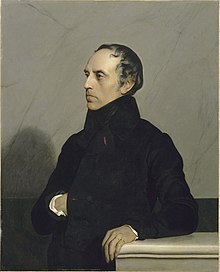François Pierre Guillaume Guizot
| François Guizot | |
|---|---|

François Guizot by Jehan Georges Vibert (19th century)
|
|
| 17th Prime Minister of France | |
|
In office 18 September 1847 – 24 February 1848 |
|
| Monarch | Louis Philippe I |
| Preceded by | Jean-de-Dieu Soult |
| Succeeded by | Jacques-Charles Dupont |
| Minister of Foreign Affairs | |
|
In office 29 October 1840 – 24 February 1848 |
|
| Monarch | Louis Philippe I |
| Prime Minister | Jean-de-Dieu Soult |
| Preceded by | Adolphe Thiers |
| Succeeded by | Alphonse de Lamartine |
| Minister of Public Education | |
|
In office 6 September 1836 – 15 April 1837 |
|
| Monarch | Louis Philippe I |
| Prime Minister | Louis-Mathieu Molé |
| Preceded by | Joseph Pelet de la Lozère |
| Succeeded by | Narcisse-Achille de Salvandy |
|
In office 18 November 1834 – 22 February 1836 |
|
| Monarch | Louis Philippe I |
| Prime Minister |
Édouard Mortier Victor de Broglie |
| Preceded by | Jean-Baptiste Teste |
| Succeeded by | Joseph Pelet de la Lozère |
|
In office 11 October 1832 – 10 November 1834 |
|
| Monarch | Louis Philippe I |
| Prime Minister | Jean-de-Dieu Soult |
| Preceded by | Amédée Girod de l'Ain |
| Succeeded by | Jean-Baptiste Teste |
| Minister of Interior | |
|
In office 1 August 1830 – 2 November 1830 |
|
| Monarch | Louis Philippe I |
| Prime Minister | Jacques Laffitte |
| Preceded by | Victor de Broglie |
| Succeeded by | Camille de Montalivet |
|
Member of the Chamber of Deputies for Calvados |
|
|
In office 23 June 1830 – 24 February 1848 |
|
| Preceded by | Louis Nicolas Vauquelin |
| Succeeded by | Jean-Charles Besnard |
| Constituency | Lisieux |
| Personal details | |
| Born |
François Pierre Guillaume Guizot 4 October 1787 Nîmes, France |
| Died | 12 September 1874 (aged 86) Saint-Ouen-le-Pin, France |
| Political party |
Doctrinaire (1814–1830) Party of Resistance (1830–1848) Party of Order (1848–1852) |
| Alma mater | University of Geneva |
| Profession | Historian, teacher |
| Religion | Calvinism |
François Pierre Guillaume Guizot (French: [fʁɑ̃swa pjɛʁ ɡijom ɡizo]; 4 October 1787 – 12 September 1874) was a French historian, orator, and . Guizot was a dominant figure in French politics prior to the Revolution of 1848. A conservative liberal who opposed the attempt by King Charles X to usurp legislative power, he worked to sustain a constitutional monarchy following the July Revolution of 1830.
He then served the "citizen king" Louis Philippe, as Minister of Education, 1832–37, ambassador to London, Foreign Minister 1840–1847, and finally Prime Minister of France from 19 September 1847 to 23 February 1848. Guizot's influence was critical in expanding public education, which under his ministry saw the creation of primary schools in every French commune. But as a leader of the "Doctrinaires", committed to supporting the policies of Louis Phillipe and limitations on further expansion of the political franchise, he earned the hatred of more left-leaning liberals and republicans through his unswerving support for restricting suffrage to propertied men, advising those who wanted the vote to "enrich yourselves" (enrichissez-vous) through hard work and thrift.
As Prime Minister, it was Guizot's ban on the political meetings (called the Paris Banquets, which were held by moderate liberals who wanted a larger extension of the franchise) of an increasingly vigorous opposition in January 1848 that catalyzed the revolution that toppled Louis Philippe in February and saw the establishment of the French Second Republic.
Guizot was born at Nîmes to a bourgeois Protestant family. On 8 April 1794, when François Guizot was 6, his father was executed on the scaffold at Nîmes during the Reign of Terror. From then on, the boy's mother was completely responsible for his upbringing.
...
Wikipedia
